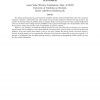Free Online Productivity Tools
i2Speak
i2Symbol
i2OCR
iTex2Img
iWeb2Print
iWeb2Shot
i2Type
iPdf2Split
iPdf2Merge
i2Bopomofo
i2Arabic
i2Style
i2Image
i2PDF
iLatex2Rtf
Sci2ools
CORR
2006
Springer
2006
Springer
How to beat the sphere-packing bound with feedback
The sphere-packing bound Esp(R) bounds the reliability function for fixed-length block-codes. For symmetric channels, it remains a valid bound even when strictly causal noiseless feedback is allowed from the decoder to the encoder. To beat the bound, the problem must be changed. While it has long been known that variable-length block codes can do better when trading-off error probability with expected block-length, this correspondence shows that the fixed-delay setting also presents such an opportunity for generic channels. While Esp(R) continues to bound the tradeoff between bit error and fixed end-to-end latency for symmetric channels used without feedback, a new bound called the "focusing bound" gives the limits on what can be done with feedback. If low-rate reliable flow-control is free (ie. the noisy channel has strictly positive zero-error capacity), then the focusing bound can be asymptotically achieved. Even when the channel has no zero-error capacity, it is possible...
| Added | 11 Dec 2010 |
| Updated | 11 Dec 2010 |
| Type | Journal |
| Year | 2006 |
| Where | CORR |
| Authors | Anant Sahai |
Comments (0)

